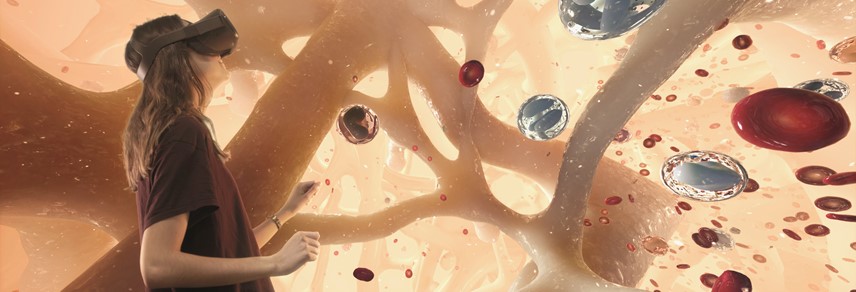
STEPPING INTO ANOTHER DIMENSION: HOW VR IS IMPROVING COMMUNICATIONS IN THE HEALTHCARE INDUSTRY
With the advent of virtual, visual communications have changed across all industries, including healthcare and pharmaceuticals. Ben Ramsbottom, medical director and CEO of scientific communication company Random42 explores the ways in which advancements in VR technology have strengthened the scientific communication experience, helping users gain a deeper understanding of how new drugs work.
Having been around in the healthcare industry for almost seven years, virtual reality (VR) is still thought of as a vaguely new concept to most. However, it is changing the way we live our lives and advancing the way our healthcare systems operate.
VR has come a long way with significant improvements in terms of both hardware and software. What started as science fiction is now science fact, and VR is fast becoming one of the most exciting advancements the healthcare industry has ever witnessed.
Scientific communication companies, like Random42, continue to widen the scope of scientific storytelling and drug visualisation. This forms the foundation of marketing campaigns for pharmaceutical companies, ranging from small biotech companies up to huge global pharmaceutical giants.
The advancements in VR technology have enhanced the scientific communication experience and promoted deeper engagement and understanding of how new drugs and products work. Users feel as though they have travelled inside the human body, watching red blood cells float alongside them or following a signalling pathway into the nucleus. VR offers a platform where the biological process can be easily understood by everyone whether they are a scientist, patient, student or investor.
The infield use of VR by sales representatives and medical sales liaisons within the healthcare industry has been extremely beneficial. In comparison with classic sales aids, a VR presentation increased the amount of time the sales rep had with a health care professional by 200%. This is an incredible breakthrough for the industry.
VR has also been used to improve patient education and understanding. Patient education ensures that they are well-informed about their condition and potential treatment options. A higher level of understanding can help reduce a patient’s anxiety and can also build trust between patient and care provider. An increased understanding puts patients in a better position to make informed decisions regarding their healthcare.
VR has also been used for medicinal purposes, such as the management of chronic pain. The software uses immersive VR technology offering motion and visual-based experiences that help patients adjust their perception of pain. There have also been many benefits of VR found in treating mental health, anxiety disorders and phobias. Exposure therapy is a really popular method among practitioners to regulate therapy for patients.
VR adds another dimension when it comes to education and training in healthcare. For any medical student or trainee trying to understand human anatomy and the biological processes that go on inside the body, virtual reality can be immensely important and hugely beneficial. The human body is a fantastic and complex work of engineering and VR can help to visualise and explore it.
One huge positive is that VR is becoming increasingly more accessible, which broadens the use for patients, students and the wider scientific community. The once bulky and awkward hardware for VR have become much smaller and cheaper over the past few years, and the content has become more varied and accessible. It’s now possible, to simply slip your smartphone into a Google cardboard and enter a virtual world from your living room. There are also many free VR apps and videos online that people can access easily opening up the experience to anyone that has access to a smartphone. Even some of the top range VR headsets by producers such as Oculus and HTC, are now much more affordable.
What we have explored above is by no means an exhaustive list when it comes to how virtual reality is changing healthcare, we have only scratched the surface. However, the advancement of VR represents an exciting and momentous era for healthcare. Medical professionals around the globe are watching with interest to see how this new field will change the industry in the years to come.


